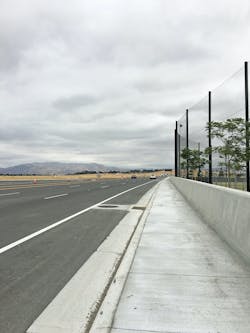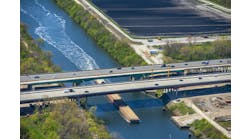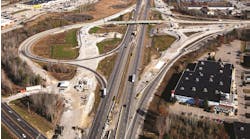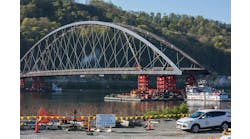There is a kind of under lining that does not call out to anyone.
Due to the 50-plus-year age of S.R. 178 in Bakersfield, Calif., as-built records for installation and relocation of gas, electric, telephone, fiber optic, water and sewer lines—tucked under the surface in all directions—were sometimes incomplete or non-existent.
Potholing was conducted in the design phase of the widening project in an attempt to map the mess, but prime contractor Granite Construction Co. had to do a lot of extra potholing to make sure nothing was hit during construction.
“At times we thought we knew the location and depth of the utility based on the designer’s potholes as-builts provided by the utility owner,” Kristina Budak, P.E., civil engineer for the city of Bakersfield, told Roads & Bridges, “but the as-builts were inaccurate because the utilities were installed at inconsistent depths and locations.”
The major utility work happened between View Street and Alfred Harrell/Comanche. Electrical, gas and telecommunication lines were relocated into a joint trench along the north right-of-way on S.R. 178, and the goal was to have all east-west overhead lines along the route underground in the trench. The relocation of an 8-in.-high pressure gas line caused the biggest impact. Initial potholing information and as-built records showed it would be able to be protected in place below the roadway, but during pavement grinding operations it was found to only have a few inches of cover. The relocation had to be designed and crews had to bore 1,000 ft of new gas line and reconnect.
During grinding, contractors Granite and Mendoza found pockets of unsuitable soil and would have to dig them out, place subgrade geotextile and place an aggregate base before paving. However, the situation became worse when a paver started to sink in the subgrade. It was decided instead of a 0.7-ft grind and a new 0.7-ft hot-mix asphalt overlay, crews would do a full-depth reclamation.
The project also had critical environmental considerations. Bakersfield has an active population of the San Joaquin kit fox, which is an endangered species, and mitigation and monitoring was required prior to and during construction. Dens in the project area had to be watched and collapsed upon assurance that kit foxes were not present. Every morning, biologists drove the project limits looking for foxes and other critters prior to daily construction activities.
The project widened 3 miles of S.R. 178 from two lanes to six lanes just east of Morning Drive to Masterson Street, and from two to four lanes from Masterson to Miramonte Drive. Between Canteria Road/Bedford Green Drive and Masterson Street, the project consisted of shifting the proposed alignment of S.R. 178 3 ft south of the existing alignment. This shift allowed the widening of the highway to six lanes while minimizing impacts on an existing 30-in. gas transmission utility easement along the north side of the highway.
Location: Bakersfield, Calif.
Owner: City of Bakersfield
Designer: T.Y. Lin International
Contractor: Granite Construction Co.
Cost: $25.5 million
Length: 3 miles
Completion Date: May 1, 2017



